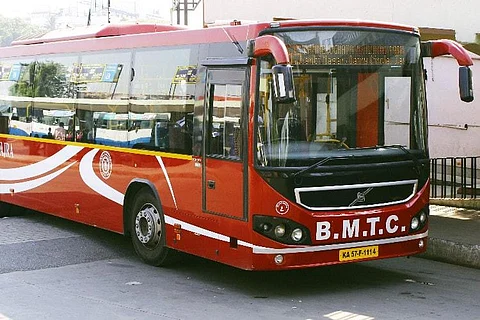

The News Minute brings you The Last Stop, a series of stories on the state of public buses across south Indian cities.
In the absence of a functional suburban rail system like that in Mumbai, Chennai or a vast metro network like Delhi, a large percentage of Bengalureans rely on the state-run Bangalore Metropolitan Transport Corporation (BMTC) buses. But over the years, the average daily ridership of the BMTC has been going down as private vehicle usage increases.
This decline in BMTC ridership has been attributed by experts to the lack of reliability of the buses and the high price of tickets, which are in fact the highest in the country. Activists have argued that fares in some cases may be more expensive than travelling on two-wheelers. This even as the length of cancelled routes increased almost 200% over four years, from 241.6 lakh km in 2013-14 to 717.9 lakh km in 2017-18.
A 2018 study of BMTC’s accounts by Janagraha, a non-profit organisation, found that unlike other state-run transport corporations in the country, the Bangalore Metropolitan Transport Corporation is not well subsidised, and is expected to fund operational expenses from own sources of revenue.
‘Unsustainable choice’
Given BMTC’s budget constraints and citing environmental concerns, some activists have advocated that BMTC not acquire more AC buses and instead use funds to increase its fleet and lower ticket prices. The primary rationale that activists make is that AC buses cost double if not triple the amount of a normal bus and consume more fuel than ordinary buses. So, more non-AC buses can be acquired by the same amount of money.
They also argue Bengaluru largely having a temperate climate does not need ACs for the majority of the year and the emissions released by the AC buses will contribute to local heating.
Sandeep Anirudhan, an activist and advocate for sustainability, said, “The facilities we are provided shapes our behaviour. Bengaluru has a naturally pleasant climate, it's a naturally air-conditioned city, and hence, it’s sacrilege if buses or trains are air-conditioned. Not only is it an unsustainable choice, but the public would also get insulated from the conditions around them, and they would normalise the destruction and degradation of habitat, pollution of air, disappearing trees, increasing temperatures, garbage and stink.”
He added, “On the other hand, if we have non-AC buses and suburban trains, people will stay in touch with their environs, and demand more trees, and improvement of the air quality and waste management, and steps to reverse the environmental damage. Better behaviour and planning will take place, only if we are connected to our surroundings and environment.”
‘AC buses make up less than 20% of total fleet’
However, this opinion is not shared by those in authority.
“The logic of replacing AC buses with non-AC buses does not make any sense. While there is no doubt the city needs at least double if not triple the number of buses, but we cannot choose to shut one in favour of the other. We will lose a specific class of bus users, especially in the airport routes if we stop AC services. We also run AC buses only where we feel there will be enough patronage. Moreover, we don’t have that many AC buses, in fact less than 20% of our entire fleet are AC ones,“ BMTC MD C Sikha told TNM.
Other BMTC officials suggested that as a public carrier like the railways, they are obliged to cater to the different needs and class of consumers.
But Shaheen Shasa of the Bangalore Bus Prayana Vedike (BBPV), a bus users and advocacy forum, said, “The cost of operations for AC buses are high. It's an unnecessary burden on BMTC and it's not at all clear if it's really beneficial in any way. The so-called shifting car users to buses is not evident and it is unlikely that the shift is large enough to cover the opportunity cost of serving much more people in ordinary buses.”
She further argued that citizens should have universal quality for all and not different quality based on paying capacity. AC buses are expensive and discriminatory based on class, Shaheen said.
She added, “As part of our informal surveys we found reliability, faster travel time, high-frequency availability of buses, less crowded buses, availability of seats etc are more important for people in public transport than AC. Moreover, if we make all buses AC, the environmental cost can also be high.”
Nimisha Agarwal, a campaigner at Jhatkaa, a non-profit campaigning platform for social and environmental causes echoes Shaheen. “There is a general perception that AC buses will attract more middle-class passengers but the problem is more with poor condition and overcrowded buses. But if we look at stats from last year BMTC decommissioned about 450 buses and added only 292 buses last year. So instead of increasing buses, the number has actually come down. In fact, in the last five years, overall there is only an addition of about 20 buses to the fleet with 1705 inducted and 1695 scrapped,” Nimisha said.
“So, the focus should be on the poor condition of the buses and lesser size of the fleet. The lack of increase in the number of buses has resulted in crowding and more and more people not opting for it,” she said.